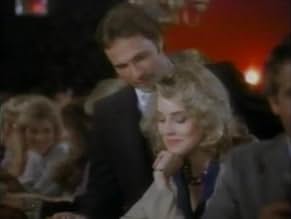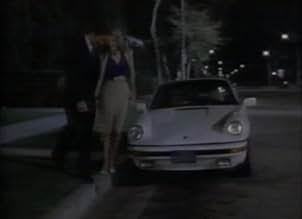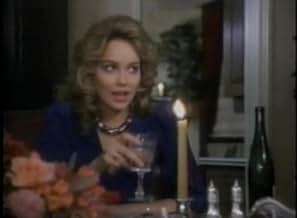Adicionar um enredo no seu idiomaA marine biologist who is celibate. A lawyer whom no woman can't seem to resist. What happens when the two of them meet?A marine biologist who is celibate. A lawyer whom no woman can't seem to resist. What happens when the two of them meet?A marine biologist who is celibate. A lawyer whom no woman can't seem to resist. What happens when the two of them meet?
- Direção
- Roteiristas
- Elenco e equipe completos
- Produção, bilheteria e muito mais no IMDbPro
Enredo
Você sabia?
- CuriosidadesVictoria Principal appeared on Johnny Carson to promote the movie in April 1982 while still in production and called An American love affair
Avaliação em destaque
I thought a story about a woman in her 30s who makes a vow to herself of remaining celibate until marriage, and meets a womanizer who's persistent with getting her to change her mind, was going to have depth, but unfortunately, I was disappointed over how silly it was. California resident Dr. Diana Dawson (Victoria Principal) is a prudish marine biologist with zero social life. The only interesting thing about her is she's an old Hollywood film enthusiast, but it's implied that she acts as though she's living in the time period of her favorite movies. After cohabiting with a guy who cheated on her, she swore to not have sex until she's married. She has a roommate whose relationship with her boyfriend is strictly physical. When she's talking to Diana, she basically tells her she's too conservative and needs to let her hair down. The focal point of the movie is her suing a construction company for their proposal to essentially remove the coastline in order to build condominiums and shopping centers. Her morals and values are at stake when she encounters the lawyer, Bob Gifford (Gill Gerrard), who has been hired by the company. She's captivated by his good looks, but then gets insulted when he expects her to sleep with him. They have an argument in a restaurant, where he purposely raises his voice to embarrass her. In the midst of their issues, she finds out her parents are getting a divorce when she takes Bob to meet them. Of course, in typical rom com fashion, everybody's problems are solved by the end of the film. Bob realizes he needs to stop fooling around, all because of a statement/question Diana made before they started arguing. She said (and I'm paraphrasing): 'you meet a woman in a bar, she goes back to your place, you sleep with her, and then you never talk to her again. What's the point?' Only in make believe land can womanizers change overnight... How nice it would be if real life was that simplistic.
None of the characters in this movie were likeable. Usually when I watch a film that has an actor playing a chauvinist, he's the one I don't like, but I found myself turned off by Diana right from the beginning. There's nothing wrong with choosing to be celibate, but she carried herself like she was better than other people. I don't know why young adults who don't engage in worldly pleasures are always portrayed as so strait-laced by the media. I'm a young woman who loves old movies, and I'm not in favor of casual sex, but I still talk about and even get excited over the attractiveness of various men. It's okay to have feelings, but in this film, I got the impression Diana was trying to avoid experiencing anything that could even be the slightest indication of a crush. She's very guarded, not just physically, but emotionally too. Towards the end, she compromises her standards by going into a bar to meet a guy, and taking him back to her apartment to have sex. Nothing happens, because she bored him the whole night talking about environmental science. So what message was this film trying to send exactly? That you should change who you are to fit in? Or that a woman can change an obnoxious man? I thought the story was disjointed, and not to mention, lacked realism. No one is going to reform after one argument... Especially considering the way it happens. It was inappropriate of him to broadcast their disagreement for the whole restaurant to hear. And she still wanted to spend time with him afterwards? I'm convinced that by the 80s, filmmakers thought people were just stupid. Anyone who goes out of their way to make a scene in public has a screw loose. In real life, women who are celibate face a lot of judgment and ridicule, and they stop corresponding with men who didn't respect their decision the first time they told him. I wonder if all of the romance garbage they've been showing over the years has contributed to people's illogical expectations of relationships, particularly millennials. I came into the world 11 years after this was filmed. Makes me happy I was a tomboy throughout childhood, playing outside, so I didn't spend my time watching nonsense like this when my brain was still developing. Unless you like idiotic made-for-TV flicks, you would be wasting your time. What a ridiculous movie.
None of the characters in this movie were likeable. Usually when I watch a film that has an actor playing a chauvinist, he's the one I don't like, but I found myself turned off by Diana right from the beginning. There's nothing wrong with choosing to be celibate, but she carried herself like she was better than other people. I don't know why young adults who don't engage in worldly pleasures are always portrayed as so strait-laced by the media. I'm a young woman who loves old movies, and I'm not in favor of casual sex, but I still talk about and even get excited over the attractiveness of various men. It's okay to have feelings, but in this film, I got the impression Diana was trying to avoid experiencing anything that could even be the slightest indication of a crush. She's very guarded, not just physically, but emotionally too. Towards the end, she compromises her standards by going into a bar to meet a guy, and taking him back to her apartment to have sex. Nothing happens, because she bored him the whole night talking about environmental science. So what message was this film trying to send exactly? That you should change who you are to fit in? Or that a woman can change an obnoxious man? I thought the story was disjointed, and not to mention, lacked realism. No one is going to reform after one argument... Especially considering the way it happens. It was inappropriate of him to broadcast their disagreement for the whole restaurant to hear. And she still wanted to spend time with him afterwards? I'm convinced that by the 80s, filmmakers thought people were just stupid. Anyone who goes out of their way to make a scene in public has a screw loose. In real life, women who are celibate face a lot of judgment and ridicule, and they stop corresponding with men who didn't respect their decision the first time they told him. I wonder if all of the romance garbage they've been showing over the years has contributed to people's illogical expectations of relationships, particularly millennials. I came into the world 11 years after this was filmed. Makes me happy I was a tomboy throughout childhood, playing outside, so I didn't spend my time watching nonsense like this when my brain was still developing. Unless you like idiotic made-for-TV flicks, you would be wasting your time. What a ridiculous movie.
- tiffanie_says_stay_in_your_lane
- 4 de set. de 2024
- Link permanente
Principais escolhas
Faça login para avaliar e ver a lista de recomendações personalizadas
Detalhes
Contribua para esta página
Sugerir uma alteração ou adicionar conteúdo ausente

Principal brecha
By what name was Not Just Another Affair (1982) officially released in Canada in English?
Responda


































